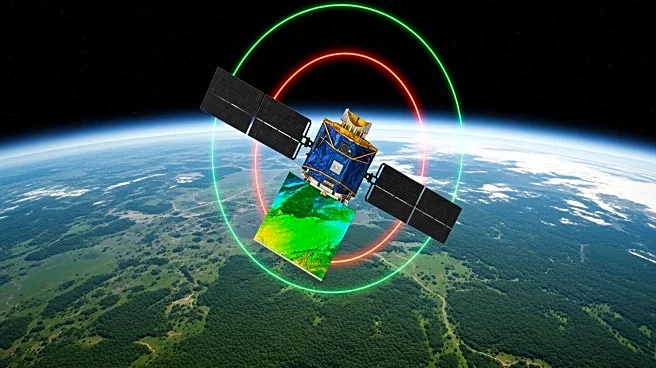What is the story about?
What's Happening?
NASA's Applied Remote Sensing Training Program (ARSET) has made its popular hyperspectral remote sensing training available as a self-paced course. This initiative aims to educate participants on the use of hyperspectral data for land and ocean systems. The training, initially conducted in 2021, focuses on the high spectral resolution capabilities of hyperspectral data, which significantly improve the characterization of vegetation types and biogeochemical processes. Participants can learn to identify chemical, physiological, and morphological traits of plants, minerals, and microorganisms. This knowledge is crucial for understanding ecosystem dynamics and can be applied to various fields, including invasive species management, forest health monitoring, and harmful algal bloom detection.
Why It's Important?
The availability of hyperspectral data training is significant for environmental scientists, policymakers, and conservationists. By enhancing the ability to analyze and interpret complex ecological data, stakeholders can make more informed decisions regarding ecosystem management and conservation efforts. This training supports efforts to address environmental challenges such as biodiversity loss, habitat degradation, and climate change impacts. The ability to detect and monitor changes in vegetation and ocean dynamics can lead to more effective strategies for preserving natural resources and mitigating environmental risks.
What's Next?
Participants who complete the self-paced course can earn a certificate of completion, which may enhance their professional credentials in environmental science and remote sensing. As more individuals gain expertise in hyperspectral data analysis, it is expected that the application of this technology will expand, leading to improved environmental monitoring and management practices. Future developments may include the integration of hyperspectral data with other remote sensing technologies to provide a more comprehensive understanding of global ecological changes.
Beyond the Headlines
The use of hyperspectral data has ethical and cultural implications, particularly in the context of indigenous land management and conservation. By providing detailed insights into ecosystem health, this technology can support traditional ecological knowledge and empower local communities to participate in environmental decision-making. Additionally, the training program highlights the importance of accessible education in advancing scientific understanding and fostering global collaboration in addressing environmental challenges.














